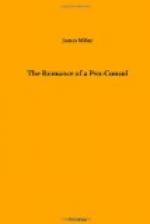‘Here,’ he said, ’were nature and man meeting together, she at her best, he at his worst. How beautiful we found Norfolk Island; how well graced, with its pine and other trees! I suppose there is no tree, growing anywhere, which for beauty could be given preference over the Norfolk Island pine. It was an evidence of the bounteous garden, set by nature amid a fresh, crystal sea, and wooed by a loving climate.
’By contrast, the convict settlement! The stricken creatures worked in irons, and when evening came, they were turned into a great court where they slept. The irons being, in most instances, removed, the quarrelling and fighting began. I heard of a convict who had been tried for killing a fellow, during some fall-out. He appealed to those judging him: “I came here, having the heart of a man, and your convict system, with its brutal associations, has given me the heart of a beast."’
England built in tribulations—nations! At first we had no better use for Australia than to moor hulks to it. That was an eddy in the nobler stream of tribulation which, like the Nile, bore all fertility in its waters. Sir George Grey sat upon a Mount Pisgah that commanded the past and the future. He saw the stream, beginning in far-away mist-crowned sources, roll down the ages. It was a flood of destiny.
‘I suppose,’ he submitted, ’we all recognise that there are certain driving forces behind the march of humanity. We may not see them, or we may merely get a glimpse of them now and then, but they are there, and always in operation. Providence; that is my word. The chief of these forces we have, as I hold, in the evolution of the Anglo-Saxon race.’
Go back to the England of Elizabeth, and what did we find? A race of hardy men, who took delight in sailing virgin seas, in becoming familiar with new countries; who were opening up fresh tracks across the globe. Following upon that, consider the drift of legislation in the British Isles, from the period of Elizabeth. It was to appropriate the land into the hands of a few, to create great landlords, to make individual men the owners, nay the tyrants, of vast areas. This meant depriving the common people of their natural means of subsistence. It forced them to maintain themselves where there was actually no room, with the outcrop of want, suffering, discontent.
The great eating up of the Irish land, the throttling of the natural wealth of that country, began with the ill work done in the Elizabethan age. Yet, the full mischief did not appear until Sir George’s own early days, when the Irish people were leaving their native land in ship-loads. In England the result came sooner, and ran on continuously, rather than burst the wave which was to engulf Ireland.




